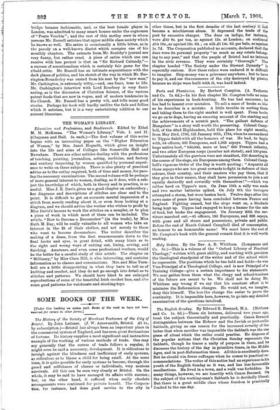Facts and Phantasies. By Herbert Compton. (A. Treherne and Co.
Is. 6d.)—In his first chapter Mr. Compton tells us some of his experiences in book-hunting. He has had successes ; he has had to lament over mistakes. To sell a mass of books en bloc as he describes is a mistake. A little trouble in sorting them and taking them to the right market is well spent. From books we go on to dogs, having an amusing account of the starting and the achievements of a scratch pack. "The gallant defence of Mangalore" is a story well worth the preserving. Colonel Camp. bell, of the 42nd Highlanders, held this place for eight months, from May 23rd, 1783, till January 30th, 1784, when he surrendered to Tippoo Sahib with all the honours of war. He had, to begin with, 64 officers, 333 Europeans, and 1,363 sepoys. Tippoo had a huge native host, "100,000, more or less," 600 French infantry, and two other European corps (number not stated), and 100 guns. Unfortunately all the garrison were not steadfast, 250 deserting in the course of the siege, six Europeans among them. Colonel Camp. bell's vigorous Order of the Day is worth quoting: "Acquaint all those sepoys who are too great cowards to fight in defence of their colours, their country, and their masters who pay them, that if they give in their names, they shall have permission to join a set equally dastardly and cowardly with themselves !"—which was rather hard on Tippoo's men. On June 15th a sally was made and two mortar batteries spiked. On July 6th the besiegers attempted a storm, but were beaten back. Twelve days after this news came of peace having been concluded between France and England. Fighting ceased, but the siege went on, a blockade being kept up. Tippoo had engaged to keep a bazaar for the sale of food, but broke the engagement. On January 30th the sur- vivors marched out,-45 officers, 180 Europeans, and 626 sepoys, with guns and all stores and possessions, private and public. Before the end of March Colonel Campbell died of consumption, an honour to an honourable name ! We must leave the rest of Mr. Compton's book with the general remark that it is well worth reading.










































 Previous page
Previous page